|
This is my dynamic, frequently updated homepage. This is a NewsLog, also known as a WebLog or Blog.
Everything is evolving, so don't assume too much.
People to watch:
Adina Levin
Andrius Kulikauskas
Britt Blaser
Catherine Austin Fitts
Chris Corrigan
Clay Shirky
Dan Gillmor
Dave Pollard
David Allen
David Weinberger
Dewayne Mikkelson
Dina Mehta
Doc Searls
Elisabet Sahtouris
Elizabeth Lawley
Euan Semple
Florian Brody
Frank Patrick
Gen Kenai
George Dafermos
George Por
Graham Hancock
Greg Elin
Hazel Henderson
Heiner Benking
Inspector Lohman
Jean Houston
Jerry Michalski
Jim McGee
Jim Moore
John Abbe
John Perry Barlow
John Robb
Joi Ito
Jon Husband
Jon Lebkowsky
Jon Udell
Jonathan Peterson
Judith Meskill
Julian Elvé
Julie Solheim
Kevin Marks
Lawrence Lessig
Leif Smith
Letecia Layson
Lilia Efimova
Lisa Rein
Marc Canter
Mark Oeltjenbruns
Mark Pilgrim
Mark Woods
Martin Dugage
Martin Roell
Mary Forest
Matt Mower
Max Sandor
Michael Fagan
Mike Owens
Mikel Maron
Mitch Kapor
Mitch Ratcliffe
Nathalie dArbeloff
Netron
Noam Chomsky
Paul Hughes
Peter Kaminski
Phil Wolff
Philippe Beaudoin
Ray Ozzie
Raymond Powers
Rebecca Blood
Roger Eaton
Roland Tanglao
Ross Mayfield
Scott Lemon
Sebastian Fiedler
Sebastien Paquet
Skip Lancaster
Spike Hall
Steven Johnson
Stuart Henshall
Thomas Burg
Thomas Madsen-Mygdal
Thomas Nicholls
Timothy Wilken
Todd Suomela
Tom Atlee
Tom Munnecke
Tom Tomorrow
Ton Zijlstra
Lionel Bruel
Loic Le Meur
Nancy White
Mark Frazier
Merlin Silk
Robert Paterson
Colby Stuart
Nova Spivack
Dan Brickley
Ariane Kiss
Vanessa Miemis
Bernd Nurnberger
Sites to watch:
Webcamorama
Space Collective
Rhizome
Openworld
NotThisBody
Junto
Escape Velocity
Emergent by Design
Do No Harm
Collective Web
Collective Intelligence
Absara
YES Magazine
WorldChanging
ThoughtsOnThinking
Smart Mobs
Nanodot
MetaFilter
Manufacturing Dissent
Independent Media
Imaginify
HeadMap
Greater Democracy
Global Ideas Bank
FutureHi
Friendly Favors
Free Expression Network
Forbidden Science
Explorers Foundation
Electronic Frontier Foundation
Edge
Disinformation
Disinfopedia
Disclosure Project
Co-intelligence Institute
BoingBoing
Action without borders
French:
Emmanuelle
Manur
Elanceur
Loeil de Mouche
IokanaaN
Blog d'Or
Le Petit Calepin
GeeBlog
Absara
Guillaume Beuvelot
Ming Chau
Serge Levan
Jean Michel Billaut
C'est pas Mécanique

I live in Toulouse, France where the time now is:
02:17
Unique Readers:

Primarily
Public Domain
Everything I've written here is dedicated to the
Public Domain.

The quotes from other people's writings, and the pictures used might or might not be copyrighted, but are considered fair use. Thus, overall, this weblog could best be described as being:
Primarily Public Domain. |
Syndication:
 ![Validate my RSS feed [Valid RSS]](http://www.newciv.org/pic/valid-rss.png)
|
| Sunday, February 11, 2007 |  |
|
|
|
For the past year my main server has been at Server4you in Germany. They had the best deal I could find anywhere, for a fast server with good connectivity. Only problem was that they turned out to only speak German, and that they wanted me to pay for a year up front, because I wasn't in Germany. Took them a couple of months to set the server up, but it worked great when it was up. At least as long as there weren't any problems. The first big surprise was when I realized they didn't have 24/7 tech support. I hadn't even imagined that possibility. So, if something goes down, it of course is always just after midnight, and particularly in the weekend, just after their support line closed. And it then turned out that my 15 minute server reboot facility doesn't work either at such a time, as somebody at their end would have to go and do it.
And then they closed their support e-mail addresses, so that one only could contact them through their online control panel, and they take a couple of days to answer most things. Or by phone, which takes hours to get through to, and costs something every time.
But so far so good until yesterday. When the server came up for renewal after the first year, I had sent a message to the accounting department if I couldn't please pay per month, rather than per year. Which it took them two weeks to respond to. After a couple of messages back and forth like that, I called them. And they repeated that no way they could do that, as I wasn't in Germany, so they had no way of controlling that I actually paid. And they said my server would be turned off soon if I didn't pay. So, I sent them their €1000 for this year, as I said I would, and sent them a fax with the bank transfer confirmation, as they said I should. That was several weeks ago, in January.
So, now, yesterday, half past midnight, somebody halts the server. Of course that's 1/2 hour after I possibly can get hold of anybody. So, I call them in the morning, now Saturday. Tech support says that my account had been cancelled and no longer exists, and there's nothing they can do to turn on the server, as it is accounting who controls it, and they of course aren't there before Monday
So, that starts to seriously suck. There's a lot going on on that server, dozens of quite popular sites, a lot of mail accounts, including my own, and many mailing lists. It can't really be down for several days.
So, most of the weekend until now I've been busy bringing everything up on my other server, at 1and1 in the States. Luckily the backup situation was pretty good, databases replicated, and other files at the most a few hours old. But, still, that is very messy, and there are always little things missing.
Seems like everything is working. But I really had better things to use my weekend for.
So, I take back any recommendation I might have made to rent servers from those guys. In the meantime, I've noticed that OVH here in France has good deals. So, if Server4you for some reason holds on to that I no longer have an account with them, and they pay my money back, that's what I'd go for.
[ Diary | 2007-02-11 17:22 | | PermaLink ] More >
|
|
| Wednesday, February 7, 2007 |  |
|
|
|
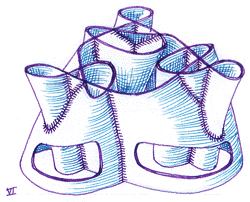 I wish I were an expert in topology and that I easily could visualize multi-dimensional structures. My intuition tells me there would be some kind of deep wisdom about life and the universe to find there. But, now, read about the best homework ever done. I don't know if that stands up, but that's what a math teacher said about the work of one of his students, Cassidy Curtis, who seems to have the unusual ability to visualize complex multi-dimensional structures, and draw them on paper, better than one can do with most available computerised tools. Like, see this thing about a torus in 3D space. Or, how about getting it as a tattoo? (Found on Metafilter). I wish I were an expert in topology and that I easily could visualize multi-dimensional structures. My intuition tells me there would be some kind of deep wisdom about life and the universe to find there. But, now, read about the best homework ever done. I don't know if that stands up, but that's what a math teacher said about the work of one of his students, Cassidy Curtis, who seems to have the unusual ability to visualize complex multi-dimensional structures, and draw them on paper, better than one can do with most available computerised tools. Like, see this thing about a torus in 3D space. Or, how about getting it as a tattoo? (Found on Metafilter).
[ Knowledge | 2007-02-07 16:03 | | PermaLink ] More >
|
|
|
|
 Talkr is a service that will read blog postings aloud to you. In a pleasant female voice that isn't half bad. Obviously mechanical, but one can stand listening to it. You find the feel for my blog here. Although you wouldn't get to hear it before creating an account and subscribing to my feed. Obviously the idea is that one then can listen to blogs in a podcast format, which is interesting. Talkr is a service that will read blog postings aloud to you. In a pleasant female voice that isn't half bad. Obviously mechanical, but one can stand listening to it. You find the feel for my blog here. Although you wouldn't get to hear it before creating an account and subscribing to my feed. Obviously the idea is that one then can listen to blogs in a podcast format, which is interesting.
[ Technology | 2007-02-07 16:09 | | PermaLink ] More >
|
|
| Monday, February 5, 2007 |  |
|
|
|

This is NASA's astronomy picture of the day for today. On January 26, people from Perth, Australia gathered on a local beach to watch a sky light up with delights near and far. Nearby, fireworks exploded as part of Australia Day celebrations. On the far right, lightning from a thunderstorm flashed in the distance. Near the image center, though, seen through clouds, was the most unusual sight of all: Comet McNaught. The photogenic comet was so bright that it even remained visible though the din of Earthly flashes. We're just missing that Superman would be flying by at the same time.
[ Nature | 2007-02-05 15:10 | | PermaLink ] More >
|
|
|
|
Software is hard, an article/interview on Salon, based on Salon co-founder Scott Rosenberg's book Dreaming in Code. About, well, why programming is hard, and why it particularly is so hard to estimate how long a given development task will take. I certainly recognize that problem. The book's sub-title is "Two Dozen Programmers, Three Years, 4,732 Bugs, and One Quest for Transcendent Software". That's talking about Chandler, which is the particular focus for the book. Chandler is an ambitious project of creating a new way of organizing personal information. It is conceived, financed and managed by Mitch Kapor, the guy who invented Lotus 1-2-3. He hired the smartest people he could find, and was even prepared that it would take a while. But it seems to take forever to even get a preview release of some kind out the door.
The seminal work about why software is surprisingly hard is of course The Mythical Man-Month by Fred Brooks, which was about the development of the IBM360 operating system, which also took forever. Part of the wisdom from that experience was that as you add more people to a software project, the complexities of the communication between them grow exponentially. It becomes much harder for anybody to know what is going on, and very hard to be on the same page, so the majority of the effort is wasted in trying. Microsoft is of course a good current example. Very smart people, but the projects get so complex that it takes thousands of people and billions of dollars, and the product ends up being several years late, and it is an incoherent mess. Brooks' solution was that programming should be done by small teams, 3-5 people, with very well-defined roles, where one person would be responsible for the overall conceptual integrity of the project.
Scott Rosenberg doesn't seem to have anything terribly revolutionary to add, but he does formulate what he somewhat jokingly calls "Rosenberg's Law". Essentially, it is the (somewhat obvious) wisdom that software is only hard and difficult to estimate when one is doing something new, something that hasn't been done before. Which is right. The people who can do very disciplined on-time software projects usually can do so because they do something that has already been done. You know, if a customer needs a website with 10 pages and 5 graphics and a menu, and that's what you do every day, it wouldn't be too surprising if you can provide an exact quote on that.
The traditional "ideal" way of carrying out the software development cycle would be a sequence of studies, of feasibility and requirements, and an analysis of exactly what needs to be done, resulting in some specs handed to the programmer, who "just" needs to do it. That has never really worked, but, in principle, if it already is perfectly clear exactly what needs to be done, of course it isn't hard. It just never is clear, because people usually don't know exactly what they want before they see some stuff they don't want, and they have a choice. So that way of developing software is going out of style. It has to be more interactive than that. Shorter cycles, involving both the programmers and the users in reviewing the progress, frequently. Which tends to be how one does it nowadays.
Part of the trouble with software is that programmers are only having fun if they're doing something new. So, even if there might be an existing solution, which would be boring, but reliable, most programmers would prefer to make their own solution. And there's no ultimate formal way of doing something new which is partially unknown.
What is missing is really tools for modeling things to do. Oh, there are diagrams one can do, but that isn't it. One would need to model the real thing, no matter what it is. Which, unfortunately, takes about the same amount of work as doing the project. So, the general problem might only be solved at around the same time when most programming will no longer be necessary. I.e. you interactively work out the model of what to do in real-time, and when you're done, the software is done too. No separation between the specification and the doing. Would be great. There are systems that do that to some degree, but so far nobody's succeeded in making it general enough.
The ultimate software project would be to invent a system that makes programming obsolete, by making it so simple that anybody can do it, very quickly. Unfortunately that's a hard.
[ Programming | 2007-02-05 15:21 | | PermaLink ] More >
|
|
|
|
 Culiblog, Metafilter. In India there's a system where homecooked meals get delivered to your office every day. Apparently that works well. Culiblog, Metafilter. In India there's a system where homecooked meals get delivered to your office every day. Apparently that works well.In Mumbai (pop +16 million) there are reported to be more than 5,000 Dabba Wallahs. A “Dabba” is a ‘tiffin’ or ‘lunch box’, a ‘Wallah’ is a man or the carrier. The Dabba Wallahs deliver home cooked meals, picked up piping hot each morning from suburban households, and distribute them to more than 170,000 office workers spread across the entire city. This system relies on multiple relays of Dabba Wallahs, and a single tiffin box may change hands up to three times during its journey from home to office.
No matter that few Dabba Wallahs can read or write, they interpret a series of colour coded dots, dashes and crosses on the lids of the lunch containers, indicating the area, street, building and floor of the Dabba’s final destination. The Dabba Wallah margin of error has been calculated at an one mistake in eight million deliveries, an accuracy that has earned the Dabba Wallah system a Sigma 6 rating by Forbes magazine. ‘Sigma’ is a term used in quality assurance if the percentage of correctness is 99.9999999 or more. Here comes the math: for every six million tiffins delivered, only one fails to arrive. This error rate means that a Mumbai tiffin goes astray only once every two months. Of course, that rate of success sounds greatly exaggerated, and I doubt it can be true, even if it maybe is a very efficient system. But Six Sigma is kind of an interesting concept. Actually that just requires 99.9997% accuracy, which would be 3.4 errors in one million, not 99.9999999%, which would be just one error in one billion, which sounds pretty unfeasible. 99.9997% sounds pretty crazy as well, if humans are involved. I suppose an automated banking system ought to certainly have that kind of error rate or better.
[ Culture | 2007-02-05 15:45 | | PermaLink ] More >
|
|
| Friday, February 2, 2007 |  |
|
|
|
 Vendors of products present you with more and more ridiculous agreements you supposedly have made with them by buying their product and opening the package. Whether you were aware of it or not, whether the agreement is reasonable or not, and whether it is legally enforcable or not. And agreement is in principle something that two or more people make consciously, after having negotiated the terms. Something that benefits both parties, a contract they enter into knowingly. But a EULA or shrink-wrap license is entirely different, a one-sided attempt of making you the losing side, by implying that you've agreed to something you probably haven't even read. So, time to fight back. Bumperactive produces stickers like this one. The idea is that whenever you're communicating with one of those kinds of companies, you provide them with an equally silly contract they've entered into just by talking to you, or receiving a letter from you. So, you can put stickers like that on the back of the envelope when you pay your cable bill. Or you can read out the terms on the phone when you call a vendor. You can adjust the text to your own purpose, of course, and add any additional small print that tickles your fancy. Sounds very reasonable to me. Vendors of products present you with more and more ridiculous agreements you supposedly have made with them by buying their product and opening the package. Whether you were aware of it or not, whether the agreement is reasonable or not, and whether it is legally enforcable or not. And agreement is in principle something that two or more people make consciously, after having negotiated the terms. Something that benefits both parties, a contract they enter into knowingly. But a EULA or shrink-wrap license is entirely different, a one-sided attempt of making you the losing side, by implying that you've agreed to something you probably haven't even read. So, time to fight back. Bumperactive produces stickers like this one. The idea is that whenever you're communicating with one of those kinds of companies, you provide them with an equally silly contract they've entered into just by talking to you, or receiving a letter from you. So, you can put stickers like that on the back of the envelope when you pay your cable bill. Or you can read out the terms on the phone when you call a vendor. You can adjust the text to your own purpose, of course, and add any additional small print that tickles your fancy. Sounds very reasonable to me.
[ Information | 2007-02-02 17:27 | 0 comments | PermaLink ]
|
|
|
|
Leif Smith, Explorers Foundation, glyph #177: Monetary Integrity — the Saracens of Spain
five hundred years — 7th to 12th centuries, CE
Writing of the history of the debasement of money, Murray N. Rothbard says:
"Rapid and severe debasement was a hallmark of the Middle Ages, in almost every country in Europe. Thus, in 1200 A.D. the French livre tournois was defined at 98 grams of fine silver; by 1600 A.D. it signified only 11 grams. A striking case is the dinar, a coin of the Saracens in Spain. The dinar originally consisted of 65 gold grains, when first coined at the end of the 7th century. The Saracens were notably sound in monetary matters, and by the middle of the 12th century, the dinar was still 60 grains. At that point, the Christian kinds conquered Spain, and by the early 13th century, the dinar (now called maravedi) was reduced to 14 grains. Soon the gold coin was too light to circulate, and it was converted into a silver coin weighing 26 grains of silver. This, too, was debased, and by the mid-15th century, the maravedi was only 1.5 silver grains, and again too small to circulate."
What Has Government Done To Our Money?, by Murry N. Rothbard, a booklet published in 1963 by the now (Dec 2004) expired Pine Tree Press, Colorado Springs, Colorado
The table of contents and full text may be found at:
http://www.mises.org/money.asp And eventually they just made money out of paper. Inflation?
[ Culture | 2007-02-02 19:16 | | PermaLink ] More >
|
|
|
|
 Is grassroots video production and sharing mechanisms like YouTube going to change the world of media? Maybe. Probably nobody's going to produce Star Wars in their garage in the near future, although there are fun take-offs. One might do mash-ups. And people might do other things that are more authentic and personal, which might be as interesting as watching TV. Is grassroots video production and sharing mechanisms like YouTube going to change the world of media? Maybe. Probably nobody's going to produce Star Wars in their garage in the near future, although there are fun take-offs. One might do mash-ups. And people might do other things that are more authentic and personal, which might be as interesting as watching TV.
Meet YouTube user MaryAnne aka Ysabella Brave. She discovered that singing was fun, so she started doing little videos of her singing classic songs, using a dinky camera and a desk lamp and no editing software. And they turned out to be popular and she developed a following. Which I can understand. She's really cute, obviously has fun with her videos, and one can't help falling in love with her. And she can sing. Oh, she doesn't hit all the notes all the time, but she puts on a great show. She has 12,000 subscribers. And now she does these little videos where she answers questions from fans and that kind of thing. And she really does seem to be an unusually sweet person.
This is a kind of reality television. There's something to say for real people. But mainstream reality TV has gotten awfully scripted, so maybe real, real people would be more interesting. Oh, I suppose not everybody is interesting. But if you have a talent or a unique angle on things, there are certainly ways you can have an audience now.
[ Culture | 2007-02-02 19:50 | | PermaLink ] More >
|
|
| Wednesday, January 31, 2007 |  |
|
|
|
 I love all kinds of website widgets that let you visualize something in the world in real time. I love all kinds of website widgets that let you visualize something in the world in real time.
How about emergencies and disasters going on right now on the world map.
You can see the ships moving around in San Francisco Bay.
There are airport traffic monitors.
You can see where there's sunlight on the planet right now.
You can see the cloud cover in your area right now.
And of course you can see who's blogging in the world right now.
Actually there isn't really that much available that you can see in real-time. I wish this was coordinated a little more, so there were just a few key places you could go to visualize most of what's going on right now.
Some people, like the Geosphere Project have worked on ways of unifying global information, although it doesn't look like much, but they're the guys who created the famous cloudfree picture of the Earth.
[ Information | 2007-01-31 18:00 | | PermaLink ] More >
|
|
| Monday, January 29, 2007 |  |
|
|
|
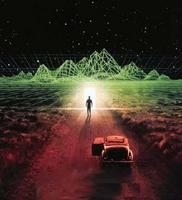 Is there one universe or many universes? What is time? Is it all pre-determined or do I have free will? Do I create my reality, attract it, or is it all already there? What am I? What is consciousness? Maybe they're hard questions, but here is one answer, in metaphorical form, in part inspired by the string theory idea that the universe has 10 dimension, and the quantum physics idea that the observer changes what is observed. With a bit of added metaphysical speculation. Is there one universe or many universes? What is time? Is it all pre-determined or do I have free will? Do I create my reality, attract it, or is it all already there? What am I? What is consciousness? Maybe they're hard questions, but here is one answer, in metaphorical form, in part inspired by the string theory idea that the universe has 10 dimension, and the quantum physics idea that the observer changes what is observed. With a bit of added metaphysical speculation.
Imagine you sit down to watch a DVD in your living room on your big screen TV. In front of you, you'll have a 2D display made up of a number of pixels. You'll be watching it from the sofa from what we could say is a point, a viewpoint, yours. The film you're watching is what could be considered a one-dimensional story-line. That is, it has a start, an end, and some points in-between, a bunch of frames, basically. With your remote control you can move back and forth in the storyline, but only in one dimension.
Now, imagine instead a universe as a virtual reality display, with a movie playing. It has huge amounts of very small pixels, sub-atomic particles. And nothing so crude as little colored dots that try to simulate a 2D picture. No, every single one of these little pixels have 10 dimension. These pixels are so versatile that they're not just going to show colors, they can be pretty much anything one can imagine, depending on how one looks at them. Time, space, mass, forces, colors, sounds, smells, etc. Because of their multi-dimensionality, they can be different things to any number of different observers. Because of the abundance of dimensions, they can also appear as being connected with one-another, in any of myriads of different constellations.
You're looking at them, and you're probably in the belief that you're looking at a 3D reality. 3D visuals with sounds and smells and touch and much more. But your storyline appears one-dimensional, just like with the movie. That's called Your Life. And you're still seeing it from what seems to be one point.
But, get this, you're watching 3D in what really has 10, or however many, dimensions. That is profoundly important.
The 3D you see, however vivid and lively it is, is nowhere near what really is there, by a long shot. It is just one angle of what is there. Or, we could say, it is a shadow of what is really there. You see, shadows of higher dimensional phenomena can easily be 3 or 4 dimensional, just like you see a 2D shadow on the ground of your 3D body. How the shadow looks depends on from where we shine the light, and from where we look.
If we were both sitting in the couch watching a movie, if it is a 2D screen, we'd expect to see more or less the same thing. But if the display had more dimensions, there'd be nothing at all to hinder that we could watch apparently different movies on the same screen, just because we looked from slightly different angles.
There are many ways that a higher dimensional object can create shadows in a lower dimension. The more dimensions, the more possibilities there are for casting huge numbers of shadows into lower dimensions. And shadows might be full 3D feel-o-rama realities if the objects casting the shadows have more dimensions than 3.
Consider a simple example of seeing fewer dimensions than are really there. A dice has 6 sides. It is a 3D object. But yet we're looking for it to show us one of its 2D sides. We throw it, see how it lands, and for a moment we agree to forget the other 5 sides, and pretend that it only presents 1 side to us, the one on top. So, we can say, "Ah, it is a Six!". The dice still has the same 6 sides, at the same time, but we choose to only show one of its 2D projections. The same dice can present 6 different realities, just by turning it.
As I said, your DVD movie has one one-dimensional story-line. But you might have the speech available in several different languages, and you might have sub-titles in several different languages, and maybe you can choose the version where the director blabbers at the same time. This adds an additional dimension, even if a rather barebones one. What else could one do with more dimensions? Well, how about if you had options for which direction the story goes at particular key plot points?
Back to the universe. The universe is made of little units with 10 dimensions or more. Meaning that whichever way you see them (in 3D), it is just a tiny fraction of what is really there. But, still, those little pixel units can provide you with what we'd consider a very full experience. Visuals, sounds, touch, smells, space, time. All of that is really just the information applied to that particular pixel. If you go small enough, the sub-atomic particle doesn't really care if it is considered to appear right now, or a million years ago, whether it is right here on your desk, or a billion light-years away, whether it is red or green or blue, whether it is hard or soft, etc. It can be all of those at the same time. All of that is just something to project on the display. Just information. Just a perspective, a way of viewing.
And since you're only experiencing 3 or so dimensions, the rest adds up to alternate plotlines, foreign sub-titles, voice-overs, trailers, bloopers and whatever else you might imagine, and a whole lot more.
People who have thought about the possibility of multiple universes, possibly being alternate versions of our world here, have usually imagined that it would be necessary that these would be 'stored' as whole, complete universes somewhere, with stars and planets and everything. Really, with enough dimensions involved, it is a lot more elegant and compact than that.
Lets say that today there was an important phone call you needed to make. Maybe your future would be different depending on whether you made it or not. It would make the difference between whether you kept your job as an accountant or whether you went off on an expedition in the Amazon jungles. Or maybe something less dramatic, but it would still be different depending on what you chose. Would you be creating a whole different universe depending on your choice, or would you choose a path that already was there, fully made? And what you chose, was that already pre-determined by the nature of the universe, and maybe you didn't really have a choice? Actually, if the universe is a multi-dimensional display, several of these can be true at the same time.
The film is already playing. But it is full of interesting plot points where you have a choice. What you have a choice about is really just what angle to see something from that already is there, and what track to continue on next. The universe is in one piece, but in 10 dimensions. Whether you go left or you go right, or up or down, it is part of the same story, just seen from a different vantage point. No reason to create whole new copies of the universe to accommodate that you might go one way or another. From a higher dimensional perspective, that exists at the same time, without conflict.
It can be hard to understand, but if we translate it to the limited number of dimension we understand, it is like you have a house with many rooms and corridors. There are many ways you can walk through the house, but it is still the same house. Whether you walk into one room or another, there's no reason to construct an alternate house to accommodate it. Several other people can walk around bewildered in the same house, and still there's no reason to construct extra houses - it can all happen in the same house. Reality is just like that, except for that the house has 10 dimensions, and every room is a holodeck. So, any number of people can walk around and make different choices, and see different things, and even start remodeling, and it all still remains the same house. Even if you're talking about the same room, it can have alternate 3D versions, simply because it really has more dimensions than that. There can be an infinity of different versions without any need for really constructing a new room.
Or you might understand it with the film metaphor again. Different things go on in different parts of the film. The beginning is different from the end. Each frame is different, for that matter. But still it is the same film with a 1 dimensional storyline. If you had something like 10 dimensions, you could have all possible plotlines, and much, much more, and it would still be the same film. If the real structure is multi-dimensional, you can construct any number of paths through it. There's no need for storing all those paths separately, as separate movies, because they're more economically stored in a multi-dimensional structure. Things really get simpler if you add more dimensions, not more complicated. Complications appear when you don't have enough dimensions to encompass what you're doing.
Now, if you're watching a multi-dimensional film, and even participating in it, it might seem like you have free will because you can choose different things along the way. We could say that this is simply an illusion because you're only watching a few dimensions, 2 or 3 for watching it, and 1 for the evolution of the story. So, you can, by your choices, construct your very own path through the movie. And it will seem like it was created by your very own choices, which it was. But the movie was already recorded. Every single choice was simply that you chose to look in the direction of one of the dimension the movie provides. You chose what channel to tune into it, but all the channels were already there. But nobody had decided which exact path you would take.
So, free will is then the perception one has when, in a limited number of dimensions, one chooses an option. If you were seeing the whole thing at the same time, in all dimensions, there would be no options, because all the options would be activated at the same time. That both validates the feeling that we have a free choice for creating our own life, and at the same time the idea that the universe is coherent and logical and physical. Your choice doesn't change the whole universe, you just pick one of the available paths.
We could say that you are a viewpoint, an observer, who interacts with the multi-dimensional universe, and that you are presented with a hologram of reality, which depends on how you look at it, or from what angle you look at it.
For that matter, we could say that your attention or your perceptions are like a laser beam that shines on the universe, as if it were a hologram. You have some choice over where it shines. And depending on where it hits, you're presented with a different version of what is there. A 3 or 4 dimensional image. The universe can easily contain fantastic amounts of possible variations, and lots of laser beams can be shone on the 'same' thing, getting quite different results.
That sort of implies that YOU are of a different nature than that which you perceive, the universe or a limited picture of it. Which might bother the physicists, but there's probably no way around it. Things are different depending on how you observe them, as quantum physics well seems to have grasped. So, obviously there needs to be an observer. I'm not here going to try to answer where the observers come from, but I think it has to be part of the equation that they're there, and that they're more than merely another hologram.
Quite possibly any form of life involves a unit of awareness. You know, the laser beam that shines on the screen of the universe to light up a particular virtual hologram. But the simplest forms might be doing nothing else. Like, imagine whatever is driving a bacterium or a virus. If it is an awareness, it is a pretty zero dimensional awareness. But it is some form of Being, nevertheless. Higher lifeforms, like humans and probably some of the smarter animals, have an additional thing, an awareness of being aware. We could say that this adds a dimension. Instead of just being a unit that perceives, it becomes something that is aware of doing so, being able to perceive itself doing so, and thus becoming capable of deliberate choices, abstract reasoning, etc. And of course we can imagine more dimensions than that, like somebody who becomes aware of that phenomenon, who arrives at a certain spiritual awakening. Somebody who doesn't just exist, but somebody who knows that they exist. And of course one could go further than that and arrive at some kind of enlightened existence, which simply could be considered as existing in a sufficient number of dimensions.
So, this all says that the universe already exists, including what you would consider the past and the future, and many of each. All pre-determined, you could say, because it already is there. But it has a lot of dimensions. So, it isn't just one fixed storyline. Rather it is ALL possible story lines, all possible combinations of all the elements. If you move around in 3-4 dimensions and that's all you perceive, then 10 dimensions is plenty for interconnecting every possible 4D phenomenon with every other possible 4D phonomenon, in every possible way, several times over. And thus providing you with an endless number of choices for how to move your awareness through this whole thing. An endless number of possible stories and possible lives.
And despite that it might all already be there, what isn't already there is what one might get out of it when one plays a laserbeam of awareness over it in a new and unexpected way. Every possibility is new and unexpected in some way, and this gives rise to surprise and learning, and evolution of consciousness. Because I'm postulating here that consciousness is something that exists that is inherently not just a projection, but something that can be aware, something that can observe. By exercising awareness, by thinking, feeling and living, consciousness can go through this 10D movie in any number of ways, and discover great things in the process, which adds value to ... something.
It is logical enough that there would be little point in a 10D movie if there were nobody to watch it. It only makes sense if there's somebody there. But ultimately I think it is all made of the same stuff. You know, like if we jump to the 11th dimension, it would be obvious that the strange quantum holodeck universe and the beings who're playing in it are one and the same thing. Just sort of a trick to play on oneself if one is a Universal Consciousness. Split yourself into zillions of different viewpoints, each one going through life experiencing a complex universe in different ways, and then get them together comparing notes, and learn how to improve on immortality. Probably there isn't really a before and after, but rather a continous feedback process. So, even though I said the film was already recorded, the universe already in existence, it has to be evolving as well. Evolving by the trial and error of many units of awareness looking for a 4D path through the 10D holographic maze.
[ Thoughts | 2007-01-29 21:44 | | PermaLink ] More >
|
|
| Sunday, January 28, 2007 |  |
|
|
|
 Toulouse is getting a new metro, line B. The city has been a bit of a mess for years while they've been working on it, as long as we've been here. OK, they're long done with the tunnels and tracks and just finishing up the stations, so it isn't too bad. And the good news is that one of the end stations is Ramonville where I live. The station isn't as close as where we used to live, at least a kilometer. But that should still make it a good deal easier to get to town. They're supposed to open the line on June 30th, but we're a bit impatient. The site of the station is still a huge construction site, but I suppose they know what they're doing. My son and I snuck in there on our bicycles the other evening, as I was curious, and we managed to walk down to the tracks. Toulouse is getting a new metro, line B. The city has been a bit of a mess for years while they've been working on it, as long as we've been here. OK, they're long done with the tunnels and tracks and just finishing up the stations, so it isn't too bad. And the good news is that one of the end stations is Ramonville where I live. The station isn't as close as where we used to live, at least a kilometer. But that should still make it a good deal easier to get to town. They're supposed to open the line on June 30th, but we're a bit impatient. The site of the station is still a huge construction site, but I suppose they know what they're doing. My son and I snuck in there on our bicycles the other evening, as I was curious, and we managed to walk down to the tracks.
[ Diary | 2007-01-28 14:31 | | PermaLink ] More >
|
|
|
|
 The Danish language is in danger says an article (which is in Danish). English is rapidly making inroads in the Danish society. Almost half of all university educations are available in English. An increasing number of Danish companies switch to English as their official internal language. And more and more English terms sneak into the everyday language. I've certainly noticed that. It is hard for Danish people to have a conversation without some English words sneaking in every couple of sentences. Usually because pretty much everybody speaks English, and certain things are just easier to say in English. The Danish language is in danger says an article (which is in Danish). English is rapidly making inroads in the Danish society. Almost half of all university educations are available in English. An increasing number of Danish companies switch to English as their official internal language. And more and more English terms sneak into the everyday language. I've certainly noticed that. It is hard for Danish people to have a conversation without some English words sneaking in every couple of sentences. Usually because pretty much everybody speaks English, and certain things are just easier to say in English.
Although Danes are fond of their own language, it is not exactly pride, and nothing that particularly translates into wanting to protect it from foreign invasions. Unlike, for example, the French, who have institutions to battle against Englishification of French, complaining loudly every time a new English word slips in. Their suggested French terms often don't catch on, even though many French people on the street might agree with their motivation. Most people say "le web", not "la toile", and they don't say "couriel", they say "e-mail" or "mél". But, still, it is much worse in Denmark, if we assume the viewpoint that it is something that is bad. There isn't particularly any agency that battles against foreign influences, and the general population doesn't care much either way. Well, there is a Danish Language Council (Dansk Sprognævn), which is interested in the issue. The news the article was based on is basically that these guys would like to at least be able to do a yearly study to examine the trends. And at the same time there are political parties who're trying to propose laws that would ensure that Danish remains the main language for certain things, like correspondence with universities.
If I lived in Denmark, I probably wouldn't care much either way. You can can't really stop trends that want to happen. But being an expat Dane, I somehow feel a bit protective of my mother tongue. Even if I myself probably mix in even more English when I speak Danish than the typical Danish person does.
[ Culture | 2007-01-28 18:00 | | PermaLink ] More >
|
|
| Friday, January 26, 2007 |  |
|
|
|
 The Ad Generator: The Ad Generator:The ad generator is a generative artwork that explores how advertising uses and manipulates language. Words and semantic structures from real corporate slogans are remixed and randomized to generate invented slogans. These slogans are then paired with related images from Flickr, thereby generating fake advertisements on the fly. By remixing corporate slogans, I intend to show how the language of advertising is both deeply meaningful, in that it represents real cultural values and desires, and yet utterly meaningless in that these ideas have no relationship to the products being sold. In using the Flickr images, the piece explores the relationship between language and image, and how meaning is constructed by the juxtaposition of the two. It is kind of uncanny. Some of them are off, but a lot of them really work.
Now, sitting watching something like that, do you think that possibly might make you immune to the manipulation of advertising? You know, because you can see through it, or maybe because you can appreciate the beauty of random pushing of emotional buttons. I wish, at least.
[ Information | 2007-01-26 15:53 | | PermaLink ] More >
|
|
| Thursday, January 25, 2007 |  |
|
|
|
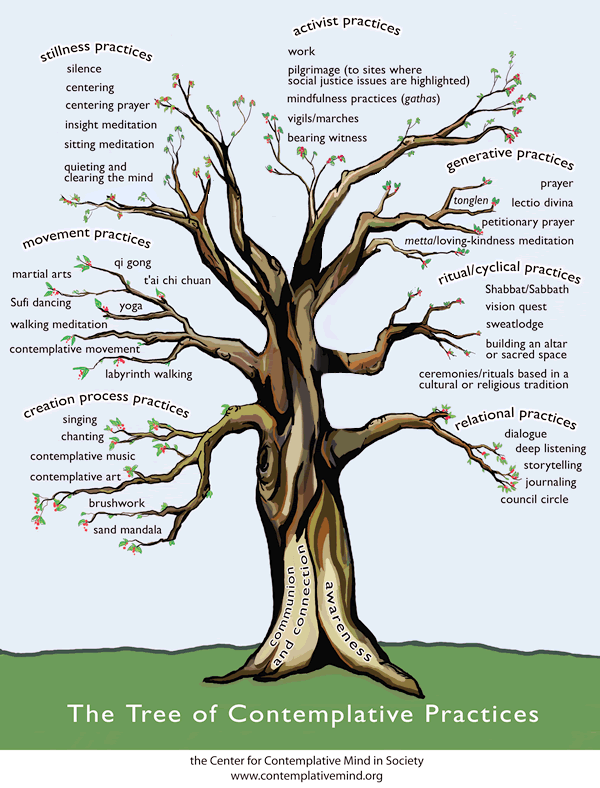
From the Center for Contemplative Mind in Society. A chart of types of contemplatative practices.
[ Inspiration | 2007-01-25 18:14 | | PermaLink ] More >
|
|
| Wednesday, January 24, 2007 |  |
|
|
|
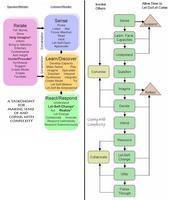 Dave Pollard talks about how we need different types to build functional communities: Dave Pollard talks about how we need different types to build functional communities:If we're going to save the world and stuff, we're going to need to bring some diverse skills and capacities to bear. The two models above, which come from these posts last year, suggest what these needed skills and capacities might be.
The problem is, we tend to gravitate towards like minds, people who think like we do, have the values we have, and to some extent have developed the skills and capacities we have. That doesn't bode well for diversity.
The Jungian model of knowledge identifies four orientations for learning, understanding and seeing the world:
* sensual (through the senses),
* emotional (through the heart),
* intellectual (through the mind) and
* instinctual (through the body/genes)
None of us is purely aligned with any one of these four orientations, but most of us lean towards one or two. Hedonists lean to the sensual, artists to the sensual and emotional, philosophers to the emotional and intellectual, scientists to the sensual and intellectual, primitivists to the instinctual, naturalists to the sensual and instinctual. As a lifelong philosopher, the intellectual and the emotional orientations (in that order) remain my forté, though as I've grown older I've refocused on the sensual and the instinctual, though I remain poor at learning and seeing the world through these orientations.
We need the artists to help us imagine and perceive and create, the scientists to help us understand and realize, the naturalists and the hedonists to keep us joyful and connected, and the philosophers to help make sense of it all. It is a puzzle. We tend to associate more with people who sort of work the same way as us than with the people who have complementary capacities to us. Like Dave, if I gathered the people I hang out with (not that I hang out very much), it would tend to be intellectual thinkers, philosophers, visionaries, maybe smart and interesting people, but also people who might be rather incapable in doing many very practical things. If I was going to be stranded on a desert island, I'd be dumb to plan to bring my kind of people. Oh, we'd need my kind of people, but we'd certainly also need very different kinds of people, more practical, more direct, with instincts for getting certain things done that are different from mine.
I find different people interesting. I love diversity. I understand that different approaches complement each other, and that's a good thing. But, yet, I don't necessarily create structures like that around me. I don't make sure that I have a community of different types of people around, who might disagree with me, but in good ways. They might see things I don't, naturally do things I'd miss.
But somehow we don't naturally create that. It might emerge because we incidentally live next to some different people, or we're born into the same family, or because we're hired to fulfill different functions in a company. But why don't we do it by ourselves?
[ Culture | 2007-01-24 19:57 | | PermaLink ] More >
|
|
|
|
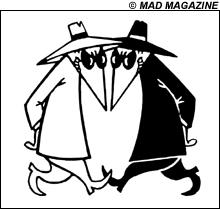 Merlin Silk writes about viewpoints, starting with the well-known concept of toddler's property rights: Merlin Silk writes about viewpoints, starting with the well-known concept of toddler's property rights:"All the toys are mine. If they are broken you can have them - but the pieces are mine!"
With a little monster like that in the house you are waiting for the time when he will be able to also see your viewpoint. The justification for that hope is that it would be good for the monster, he will understand people around him better, and have it much easier easier in life once he gets it in is head that "you get much further when you understand thy neighbor."
But let's be honest, it's mostly because I want the monster to see my viewpoint, right? That's why I am still trying to instill this ability to see a situation from somebody else's point of view - even if that "somebody else" is I.
Recently I started to ponder the idea that this might actually not be a good ability to have. Blasphemy, I know.
I might have mentioned - did I ever! - that I am working on a gut understanding of the idea that "the world is as I see it." But I am still falling - again and again - into the trap of seeing a situation from the viewpoint of another person. For example I know exactly what my significant other is doing wrong and what she should do different when there is a grinding noise in the relationship-gearbox: she should not blame me for something going south because she attracted that into her life, right or right? And Gunter had a short comment.
The thing is, is it always right to try to assume other people's viewpoints. I know I do it. I often bend over backwards to try to see everybody's viewpoint. Which I suppose is a noble thing to try to do. Might make you a good diplomat. But possibly it also makes things complicated in terms of getting something done. You sort of have to second-guess what everybody thinks, and try to find the optimum solution for everybody concerned.
I sometimes get intrigued by or even attracted to people who don't work that way at all. People who only focus on what they want, what they're sure is right, possibly even without any kind of logical rationale, but merely an emotional certainty that they ought to do what they want to do. I find it a little puzzling that people like that even can exist. That they don't get themselves killed every other week. But sometimes it is those people who're more effective in many ways than I am, getting things done, because the world is more simple to them.
I was in this improv theatre group years ago. Very useful to get me out of my head. I loved the people in it, but they were all different from me. If there was any kind of discussion about something, I would as usual bring forward well considered logical arguments for one thing or another. And I'd quickly notice that nobody was listening to them, because it didn't matter to them at all. These were more emotional people. Different things made them tick, like stuff that made them feel something. Which I learned to appreciate.
So, *should* one consider other people's viewpoints? I guess it is a good thing to be able to, to aim for as much harmony as possible. But one probably also needs to realize that it is a little futile, that you never completely can see it somebody else's way. So, sometimes the more effective thing to do is to get really clear on what *your* way is, to make sure you really are in integrity with it, and then go for it. I mean, who else is gonna go for your thing other than you?
[ Thoughts | 2007-01-24 20:42 | | PermaLink ] More >
|
|
<< Newer stories Page: 1 ... 9 10 11 12 13 ... 97 Older stories >> |
|

This is a collage of things that catch my eye, things that need to be said, and stuff I really care about
TRUTH
BEAUTY
FREEDOM
LOVE
TECHNOLOGY
|
| Mon | Tue | Wed | Thu | Fri | Sat | Sun |
|---|
| 1 |
2 |
3 |
4 |
5 |
6 |
7 |
| 8 |
9 |
10 |
11 |
12 |
13 |
14 |
| 15 |
16 |
17 |
18 |
19 |
20 |
21 |
| 22 |
23 |
24 |
25 |
26 |
27 |
28 |
| 29 |
30 |
|
|




